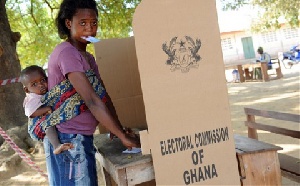- Home - News
- TWI News | TV
- Polls
- Year In Review
- News Archive
- Crime & Punishment
- Politics
- Regional
- Editorial
- Health
- Ghanaians Abroad
- Tabloid
- Africa
- Religion
- Election 2020
- Coronavirus
- News Videos | TV
- Photo Archives
- News Headlines
- Press Release
Opinions of Friday, 29 July 2016
Columnist: Osei, Nana Yaw
Election 2016 anchor: Beware the ides of March
History and antiquity have taught us many valuable lessons. For example, in Roman history, “the ides of March” marked the assassination of Julius Caesar on March 15, 44 BC. Julius Caesar, the Roman dictator was stabbed to death in Roman senate by 60 conspirators led by Marcus Brutus and Gaius Cassius Longinus. The death of Caesar ended the Roman Republic.
In his famous play, Julius Caesar, Williams Shakespeare popularized the ides of March in which a soothsayer warned Caesar to be careful on March 15 (the ides of March), even so the tyrant ignored the spiritual guidelines with calamitous implications. The purpose of this article is to reconcile our history as Africans with our present national discourse and look at the dangers associated with Ghana’s “ides of March” (mistrusting electoral commission).
As Marcus Garvey observed: “A people without the knowledge of their past history, origin and culture is like a tree without roots.” Besides, the British political theorist and philosopher, Edmund Burke (1729-1797), asserted that: “people will not look forward to posterity who never look backward to their ancestors.”
As Ghanaians and for that reason Africans, we are the products of the most egregious holocausts in the world and that is colonization and the Trans-Atlantic Slave Trade. Europe, after coming out of the Crusades and one of the most notorious phony charades of human history, became very much interested in nationalism. Nationalism in Europe was a motivating factor behind colonization just as African nationalism did away with colonization.
I think colonialism is not entirely over. For example, Baffour Ankomah, editor of New African, a pan-African magazine reported what Stan Mudenge, a Zimbabwean diplomat told him about Robin Cook, a former British foreign secretary. The reputable pan African journalist revealed what Mudenge claimed were the words of Robin Cook: “you guys must get rid of Bob (President Mugabe), and Stan said he had told Cook back.
For the same reason that you guys want him out, we want him in.” We need to think through our history and the atrocities bequeathed to our ancestors and see ourselves as one people with a common heritage and destiny. We have soon forgotten that during slavery, and colonialism, Africa and its people were inflicted with depopulation, cultural usurpation and inhuman treatment.
For example, in the 15th and 16th centuries, the Portuguese passed an ordinance (Regimento) to chop off one ear of an African for breaking a plate. It is quite unfortunate that there is no memorial observance to this event any place in all the globe. The Africans on the continent of Africa have not thought of properly memorializing their loss while Africans in dispersion, the major victims of slavery and colonization, have not mounted edifices or monument to remind the posterity about African holocaust.
This is notwithstanding the existence of the pan African festivals. What is particularly lamentable is that history as a subject is gradually diminishing in schools at Africa. The ancestors of Africa are angry, for those who believe in the powers of the ancestors, the proof of their anger is obvious. For those who do not believe in ancestors, the proof of their anger is given another name (Mazrui, 1986).
One of the negative implications of European colonization in Africa was the usurpation of African’s own legitimate royal institutions and frameworks of authority. As colonization and acculturation gathered momentum, Africans native institutions started to emaciate, though not always completely.
Indeed, one of those institutions- from Ashanti to Buganda, from Morocco to Swaziland-managed to find the resilience to survive the cultural and political corrosive power of European colonization (Mazrui, 1986).
As Ghanaians, we must look at our position on the globe as the beacon of Africa’s democracy and eschew electoral conflicts. The purpose of governance is to correct social and economic uncertainties in a country. We have a common heritage as people. We are bothered by three Francophone countries and the ocean which, I think must change our perception about electoral violence. If we allow the institutions to work, peace will always prevail.
During the independence celebration of the Republic of South Africa, Professor Ali Mazrui, reminded the South Africans to be mindful of the four Vs (victim, victor, vanguard and villain). Our citadels of the past namely: Cape Coast, Elmina, Christiansburg castles and fort Prinzenstein at Keta in the in the Central, Greater Accra and Volta regions of Ghana respectively definitely attest to our status as victims of slavery.
Our political independence through the efforts of our founding fathers, Joseph Peter Brown, Jacob Sey, John Mensah Sabah, J. E Casely Hayford, and the big six had plunged us under exhilaration of victory. Ghana is one of the vanguards of African democracy. Nevertheless, we must be careful with the last “v” villain. Conflicts will negate all our good fights and make us incapable of condemning the injustices meted out to Africans in history.
As Dr. Martin Luther King Jr observed, “Injustices anywhere is a threat to justice everywhere.” Our colonial powers were stronger than us and they subjected us into servitude. If we have power to govern and as such instigate our society to interlock horns, then we have no moral rights to condemn the atrocities of the colonial past.
We cannot afford to destroy what we have built over the years. This years’ elections must focus on issues rather than acrimony and character assassination. Our ides of March we must be careful about is “the mistrust of state institutions, such as the electoral commission.” Certitude is not the test of certainty.
We have been cocksure of many things that were not so (Oliver Wendell Holmes Jr). We must also look at the other ides of March in future (Winner takes all and the excessive powers of the President). We can avoid conflicts by trusting our state institutions. God bless our homeland Ghana
Reference
Mazrui, A. A (1986). The Africans, a triple heritage, Boston, Toronto, Little, Brown and Company.
Feedbacks must be directed to padigogoma77@yahoo.co.uk Nana Yaw Osei (Padigo), PhD Candidate, Psychology Grand Canyon University, Arizona, USA











